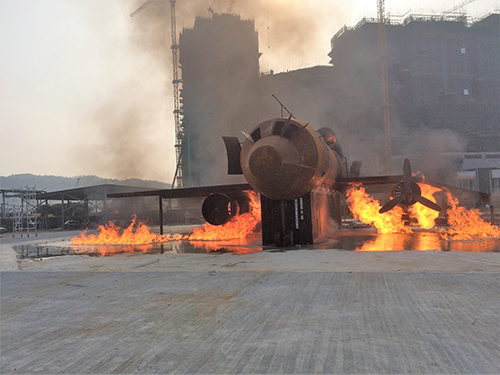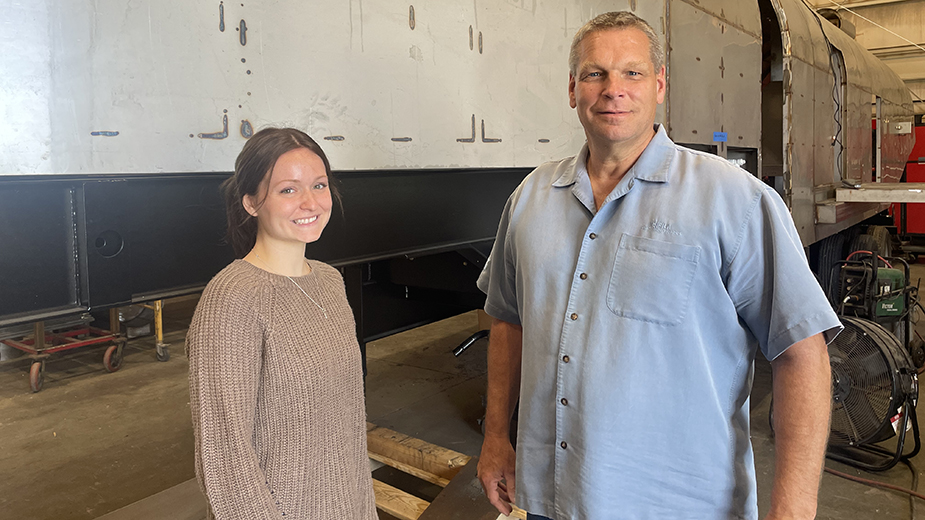FOWLER TOWNSHIP, Ohio – A business based here has set the world ablaze.
The company, Kirila Fire Training Facilities Inc., fabricates mock aircraft, buildings and platforms specifically equipped with fire-training systems that today serve customers in more than 25 countries.
“We design, build, manufacture, install and maintain fire training equipment throughout the world,” says its president, Jerry Kirila.
The company was established in 2007. Soon thereafter, it began working with the U.S. Department of Defense, serving not only domestic locations, but bases in foreign countries as well.
The strong relationship with Defense helped to leverage Kirila Fire’s stature and reputation, as other governments looked to the United States for help with their fire-training programs.
“Since the Department of Defense has one of the strongest fire-training programs in the world, a lot of other organizations look up to them as a mentor to copy and follow along,” Kirila says.
Thus, the company’s strong ties to the U.S. military’s program helped to vault it onto the international stage.
“They need the equipment to train, and people started coming to us. That’s what really gave us our birth in the international fire-training industry,” he says.
Nevertheless, Kirila says the company was a bit apprehensive about moving full throttle into the global market, given the learning curve associated with matters such as international law, shipping, tariffs and taxes.
“We’re equipment manufacturers. We’re not international business folks,” he says.
That’s when Kirila sought out the Ohio Small Business Development Center’s Export Assistance Program at Youngstown State University.
“They provide us with a lot of support,” he says, such as help in reviewing contracts with foreign governments and customers. “They’re really good at it. The program points us in the right direction.”
On a pleasant spring afternoon, employees on the shop floor are busy welding, fitting and assembling two large mock aircrafts. Kirila designs the aircraft and sends metal parts to service centers for bending and shaping. The components are returned to the shop where they’re assembled and fitted with the company’s patented fire ignition systems.
“We’ve built some that wouldn’t even fit in the building,” he says. “One in Wisconsin took 14 oversize loads. That project had over one million pounds of steel in it.”

These mock aircraft are outfitted with proprietary burners and ignition equipment that the company has engineered and designed. Kirila also builds training facilities resembling structures from repurposed shipping containers and other materials to train firefighters faced with residential or industrial emergencies.
“We do a lot of industrial props for refineries,” he says. “We send a lot of stuff to Houston.” The company has also performed this type of work for customers in Saudi Arabia. “Saudi Aramco is a regular customer of ours.”
Simply put, Kirila describes his company as a business that studies “the science of fire” and how it behaves in various situations. Once this is done, the company has software that can re-create fire patterns based on variables such as wind direction and speed.
“Our system knows which way the wind is blowing, how fast it’s blowing and our software will make that fire propagate and move the way the wind is blowing,” he says.
Today, about a quarter of Kirila Fire’s work is international. The company recently landed a major contract with the Defense Department of Canada.
Kirila Fire has partnered with the Export Assistance program since 2016 and this year hired a summer intern from the program.
Kodi Kinsey, who just finished her sophomore year at YSU as a business administration major, says she joined the program because she is interested in how business works, especially globally.
“I decided to apply and was accepted into the program,” she says, although she admits to having little knowledge of international business. “I did have an interest on learning about how larger markets expand internationally and the competitive aspect.”
Throughout the course, Kinsey says she studied and worked on modules that involved several facets of international trade, including regulations related to defense industries.
“There was a lot I didn’t know,” she says. “Now I know a lot about duty drawbacks, export documentation, ITAR [International Traffic in Arms Regulations] and EAR [Export Administration Regulations].”
Kirila says his long-term goal is to hire someone full-time who deals largely with the company’s international trade segment. “There’s a lot to figure out just to bid a project. And the more savvy we are, the more competitive we can be in the market.”
Kinsey completed the program’s spring course, YSU’s Export Assistance, under the direction of Mousa Kassis. He paired students with prospective companies whose needs fit their expertise.
The internship carries three credit hours. “At the end of the summer internship, you’re able to ask for an extension throughout the school year and you also have the potential of becoming a full-time employee,” Kinsey says.
Among her first tasks was to iron out an issue involving foreign taxes, getting on the phone with U.S. and Canadian customs brokers to find a resolution. Ultimately, the Small Business Development Center became involved.
“I’m also working on bid proposals,” she says. “I’m definitely learning a lot and there’s more to come.”
One example Kirila cites is shipping a product to the South Pacific. “Your pallet or crate has to be made out of a certain type of wood,” he says.
The company employs 50, many who work in various states and overseas representing the company.
“I’d say we’re definitely one of the top three companies in the world doing what we do,” he says. “We seem to have a lot of success with it.”
All indicators point to a rebounding global market for Kirila Fire’s services.
The biggest roadblock over the last several years, Kirila says, was the pandemic. Not only did it shut down the domestic economy, international markets and countries were closed to outside travel, making it harder to conduct business.
Afterward, the company had to work through challenging supply chain issues at home and abroad as it rebuilt its international customer base.
“Stuff that we used to get in three to four days now took 12 to 13 weeks,” he says. “I think that’s all behind us. We’re hoping the international market continues to grow for our company.”
Meanwhile, new environmental regulations have led to the adoption of several chemical agents that firefighters use to combat flames, Kirila says. These new materials often call for various methods of extinguishing the blazes, which in turn changes the fire-training facility.
That means many training facilities around the world are likely to require modifications or new builds to accommodate technique changes in the industry, Kirila says.
“It’s something new in our market space. We’ve already installed some facilities. And I think we’re going to be in a good spot for a long time,” he says. “We’re excited.”
Pictured: Kodi Kinsey, an intern from YSU, is helping Jerry Kirila’s company grow globally.

